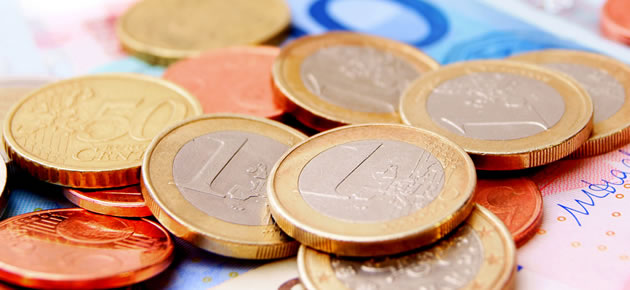The Euro remained under pressure against the Pound on Friday following the release of worse than forecast German producer price inflation data. Against the US Dollar the single currency was holding near a two-week high as the Federal Reserve’s latest policy statement continued to weigh upon the US currency.
Data released earlier in the session showed that producer price inflation in Germany, the Eurozone’s largest economy, fell by 0.2% last month. The figure was below economist expectations for a rise of 0.2% and added to the 0.1% downturn seen in April. The data adds to worries over deflation in the Eurozone.
The International Monetary Fund warned that in order to tackle low inflation the European Central Bank will have to introduce a full scale quantitative easing programme.
“If inflation remains stubbornly low, the ECB should consider a large-scale asset purchase programme. This would boost confidence, improve corporate and household balance sheets and stimulate bank lending,” the IMF said in its assessment of the Eurozone economy.
If the ECB do choose to introduce such measures than the Euro will fall against the Pound and other major peers something that the regions policy makers would likely be happy to see as the currency remained stubbornly high following the decision to cut interest rates to a new record low and the introduction of a negative deposit rate.
“I think there is no disagreement with the IMF. We’ve been clear that in case inflation would be too low for too long, we can use additional instruments, including additional non-conventional measures, But we are not in that situation today,” ECB Executive Board member Benoit Coeure told reporters in Luxembourg today.
The IMF analysis of the 18-nation economy doesn’t paint a pretty picture as it notes that output is still below pre-crisis levels, inflation at 0.5% in May is worryingly low and said that the unemployment rate being at 11.7% in April was “unacceptably high.”
The Euro came under further pressure after data showed that Greece’s current account deficit widened in April. The deficit widened to €1.67 billion, more than the €1.151 billion seen in 2013.
Another report showed that the wider regions current account surplus increased in April thanks to a rise in trade. The surplus rose to a seasonally adjusted figure of €21.5 billion from the previous months figure of €19.6 billion.
Euro Exchange Rate News:
[table width=”100%” colwidth=”50|50|50|50|50″ colalign=”left|left|left|left|left”]
Currency, ,Currency,Rate ,
Euro,
Euro,
Euro,
Euro,
[/table]
